Ideanomics Unveils Plans to Transform Former UConn West Hartford Campus into Fintech Village

Audio By Carbonatix
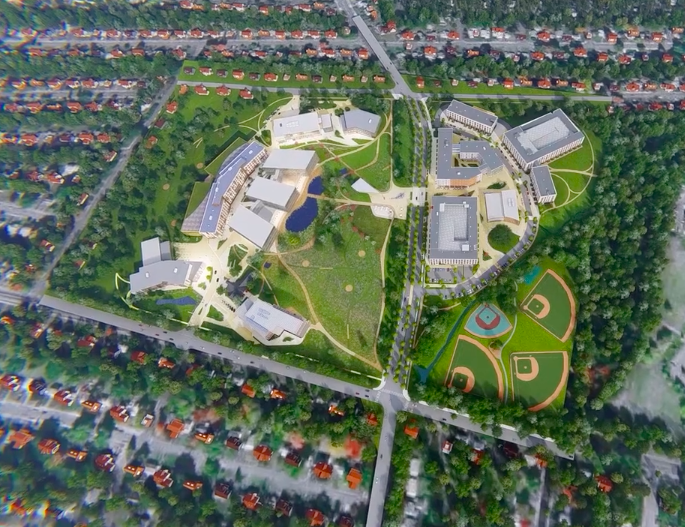
Overview of Fintech Village. (Screenshot from Ideanomics video)
Ideanomics Chairman Dr. Bruno Wu and CEO Alf Poor held a press conference Monday morning in West Hartford, unveiling renderings of plans for Fintech Village in West Hartford.
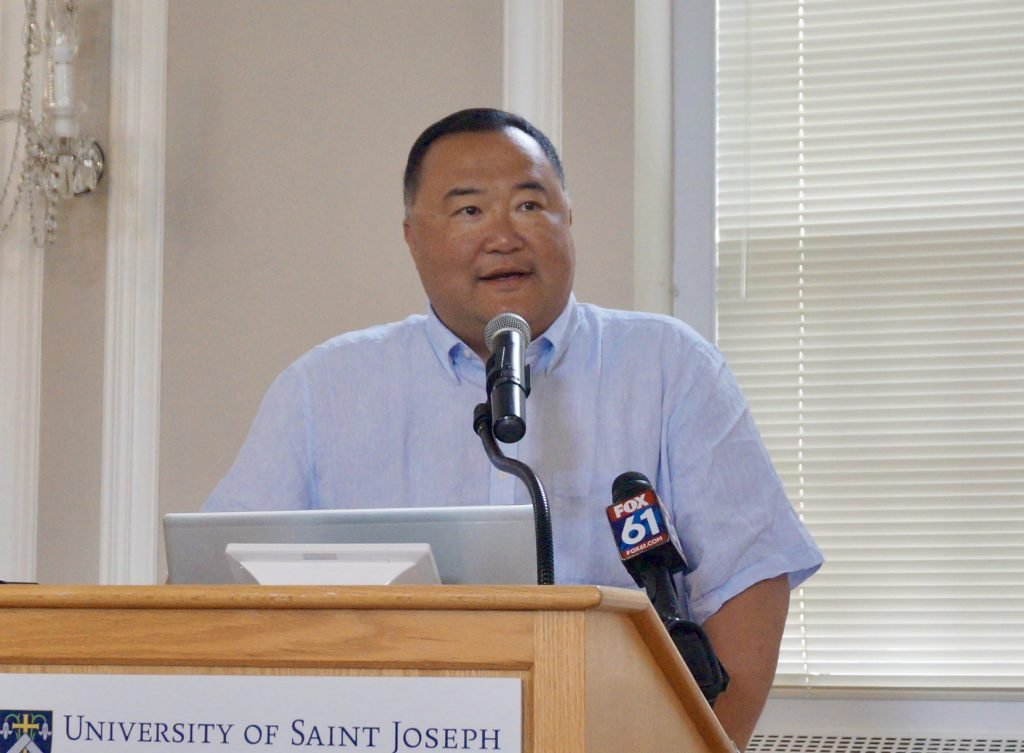
Ideanomics Chairman Dr. Bruno Wu. Photo credit: Ronni Newton
By Ronni Newton
The chairman of Ideanomics envisions Fintech Village as both a center of technology and innovation – in fintech as well as in other industries – and a walkable campus affording public access to trails and a wetlands park designed to showcase the bucolic 58-acre setting of the former UConn West Hartford branch.
Fintech Village will also include public amenities like an art gallery and community center, and the existing Little League and Miracle League fields – which will have revamped and more accessible parking. In addition, there will be office, laboratory, and residential facilities, and services to support the estimated 400 people who will be working there daily on high tech solutions for financial, insurance, medical, transportation companies, and other businesses, utilizing blockchain, artificial intelligence, and other “next generation” technologies.
“Nearly one year ago, I expressed our hope to call West Hartford our home,” Ideanomics Chair Dr. Bruno Wu said in a news release in advance of a press conference Monday morning at the University of Saint Joseph, which is adjacent to the Fintech Village campus. “Today, I am pleased to be able to share with you the reality beyond the vision.
“Starting today, we take our largest step from blueprint to reality. Here in Connecticut, the front yard of the insurance and financial centers that call Connecticut and the Northeast their home,” Wu added.
Ideanomics plans to invest more than $400 million into the campus and employ at least 400 people as they create an innovation hub that will “bring the tech jobs of the future” to West Hartford, and strengthen the town’s grand list while at the same time maintaining and enhancing the property’s park-like setting, the release states.
Wu said that “Fintech Village will be a unique and special project, the likes of which Connecticut has not seen. I thank former Gov. Malloy for his support and Gov. Lamont for being such a great partner and helping to make this day happen.”
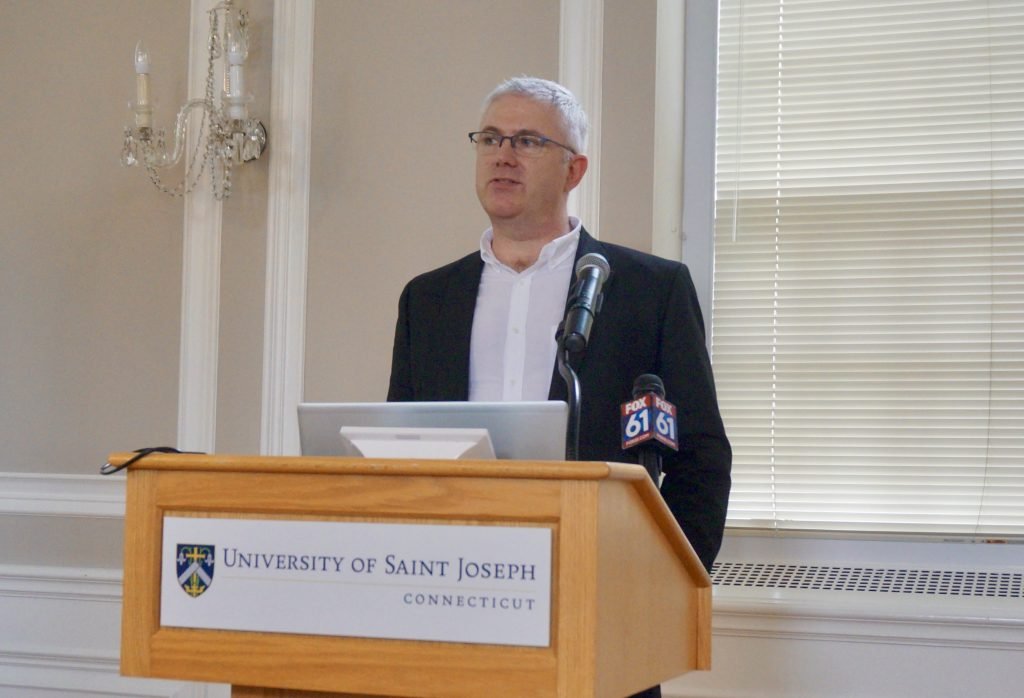
Ideanomics CEO and Fintech Village President Alf Poor. Photo credit: Ronni Newton
Ideanomics CEO Alf Poor, who also serves as the president of Fintech Village, said in the release that, “We have spent the past 10 months with our partners to design a specialized workplace that will stimulate both innovation and collaboration, and be an open campus with features and benefits that West Hartford residents spoke of in their town-wide Community Visioning Process last year.”
Monday morning, Poor told media and invited guests that Ideanomics loves West Hartford and chose the town because of its proximity to Boston and New York as well as Hartford. “We believe West Hartford is going to love Fintech Village as well,” Poor said.
The features included on the campus will improve the community, and there will be open space where people can stroll or walk their dogs as well as a public plaza, and the ball fields will be preserved.
The vision also includes places to perhaps eat, drink, or get a haircut. “I don’t really [know what] the mix of retail will be at this point … we’re not looking to do anything to compete with Blue Back Square, but obviously we are looking to cater to to the large number of people living and working on the campus,” Poor said.
The campus will connect to the Trout Brook Trail, wetlands will be preserved and perhaps re-engineered, and there should be no concern about the fate of wildlife.
“We are looking to do a ‘smart campus’ as well,” Poor said. While most buildings will be open to the public on the ground floor, areas that are not will be accessible through state-of-the-art biometrics.
“This is a very exciting project for the town, the region, the state,” said Town Manager Matt Hart. “Based on what we’ve heard today it hits many of the points in our vision statement.”
Hart said that public input will be very important, and he is very much looking forward to receiving the applications in more detail, and bringing them to the Council and the community. He also noted that he appreciates Ideanomics’ understanding of the town’s “deliberative process.”
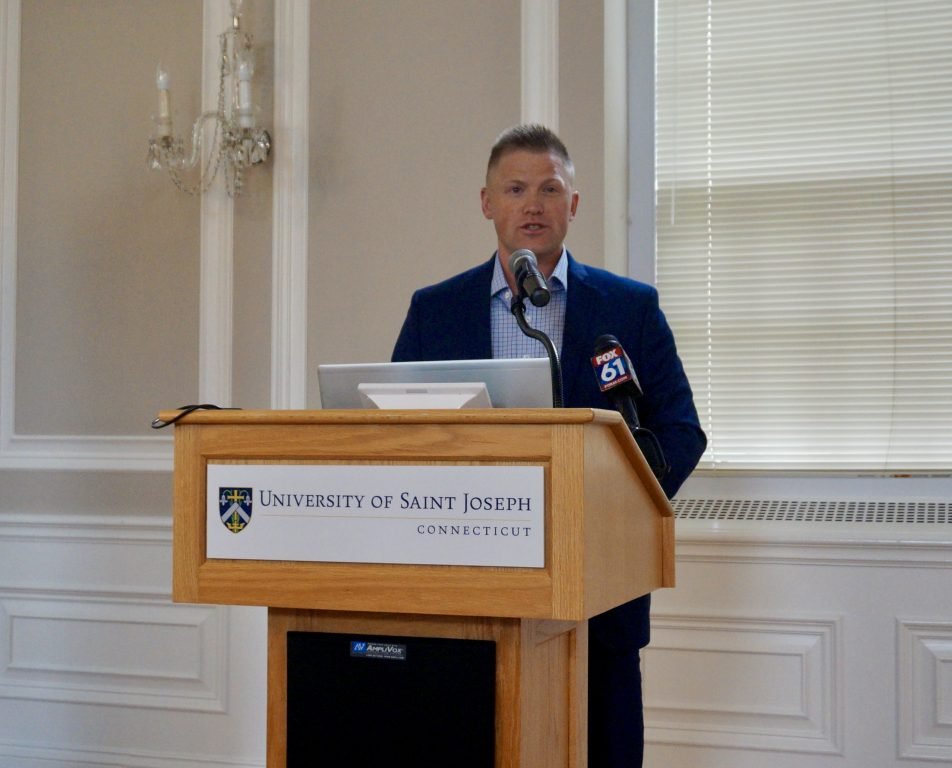
A. Brooks Fischer, principal at Newman Architects who designed the project. Photo credit: Ronni Newton
A. Brooks Fischer, principal with Newman Architects and a West Hartford resident, who created the project plans, said that “West Hartford is a very special town,” and this project will be transformative to the town and state.
“What we’ve designed here, along with Dr. Wu and Alf Poor, is something very special, something that will change this place for everyone,” Fischer said. The campus will be an open place, a gathering place, a place the community can call home.
The initial plans – which can be seen through the below link to an eight-minute video that provides a 360-degree flyover and walking tour of Fintech Village – provide the vision of what the campus may ultimately be, Fischer said.
Ideanomics Fintech Village Global Headquarters for Technology and Innovation from Newman Architects, PC on Vimeo.
West side
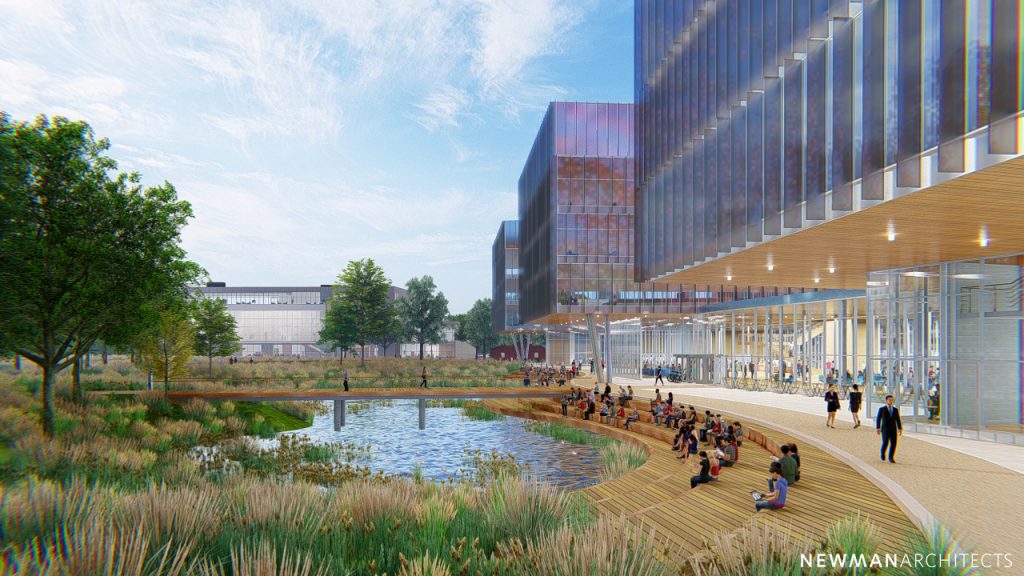
View looking south from the Innovation Hub’s Wetland Overlook to the public Art Gallery. Courtesy of Ideanomics
The west side of Trout Brook Drive will be the hub of Fintech Village.
Four of the five existing buildings will be demolished, with new structures occupying essentially the same footprint. The ground floors of the offices and laboratories, which may also contain amenities, will be open to the public.
The former Undergraduate building will become the Ideanomics “nerve center,” the headquarters connecting the company with its operations around the world.
The former maintenance building will become the Ideanomics platform management building.
A public art gallery that faces Asylum Avenue will showcase local and international works, and will be accessible to a pathway connected to the Trout Brook Trail – a pedestrian and bicycle path that will ultimately reach all the way to New Park Avenue. Portions of the trail are already in use, while others are in the design, approval, or funding phase.
A “gateway promenade” will lead from Trout Brook Drive to the tiered Ideanomics Pavilion, a gathering space that will be open to the public, and walkways will be flanked by seating around the campus’ ponds.
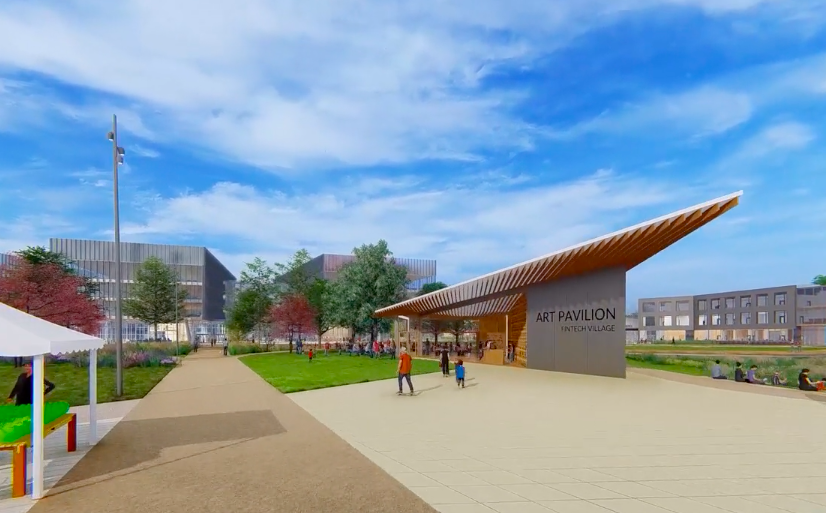
Ideanomics Pavillion. (Screenshot from Ideanomics video)
A local arborist has been engaged to catalogue the campus’ mature trees so they can be protected and preserved.
Ideanomics previously planned to renovate two of the existing buildings, but once the company purchased the campus and was able to do its own environmental testing, the quantity of polychlorinated biphenyls (PCBs) and asbestos that needed to be remediated rendered that plan economically infeasible.
CEO Alf Poor said last month that there would be “effectively no way to save” the two buildings that the company initially planned to renovate due to the amount of contaminants they contain. Ideanomics will need to incur the additional costs of demolition as well as complete new construction, but it will allow for a faster and more effective clean-up of the hazards.
New construction, Poor said Monday, will allow for more capacity without impacting the density.
Ideanomics has already started the clean-up process, and has filed asbestos abatement notifications with the Connecticut Department of Health and is awaiting approval of its PCB disposal plans by the Environmental Protection Agency (EPA).
Asbestos abatement should begin this week, and Ideanomics hopes that the PCB removal and disposal can commence by late summer or early fall.
All new buildings will be built with green technology and to high energy-efficiency standards. Poor said that the company will seek LEED certification for many of the buildings, and others will incorporate green technologies such as window glass that automatically adjusts to light levels and eliminates the need for shades.
Trout Brook Drive
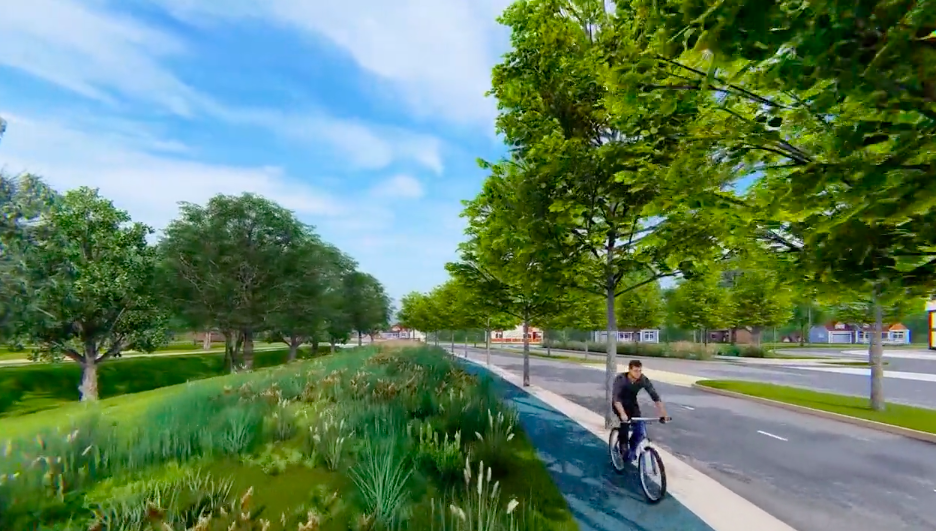
Rendering of Trout Brook Drive with traffic-calming measures. (Screenshot from Ideanomics video)
Ideanomics plans to fund enhancements to the roadway, including implementing a “newly-engineered traffic calming design” complete with bike lanes, walking paths, some on-street parking, and a more pedestrian-focused experience than exists currently.
Trout Brook Drive currently becomes a “bit of a racing circuit” in the vicinity of the campus, Poor said, and traffic calming measures will address that.
“I think that’s something the Town of West Hartford will welcome,” he said.
East side
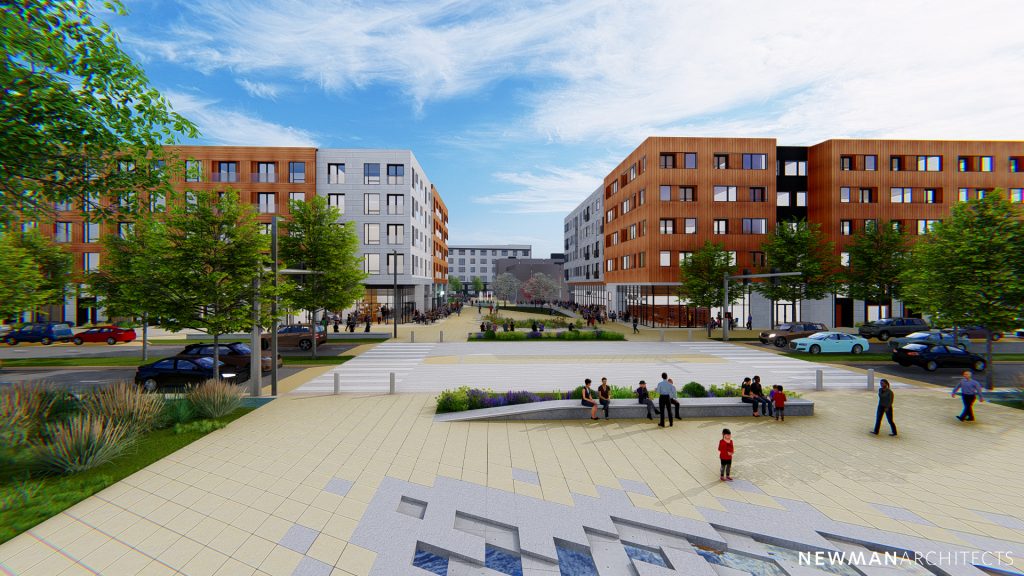
View looking east across Trout Brook Drive into the heart of the Civic Plaza. Courtesy of Ideanomics
The 1,050 parking spaces on the eastern side of Trout Brook Drive will be transformed into corporate living spaces where the 400-plus people who will be working at Fintech Village will be able to live. According to Ideanomics, the non-traditional hours of many of the jobs will make having residential facilities critical.
There will also be a plaza with small shops and dining establishments that includes a civic plaza where there will be public art on display.
A community center will offer recreational activities and event space that will be able to be utilized by organizations. According to the video, that building “will frame and celebrate the enormous white oak – estimated to be four to five centuries old and the largest in the state of Connecticut.”
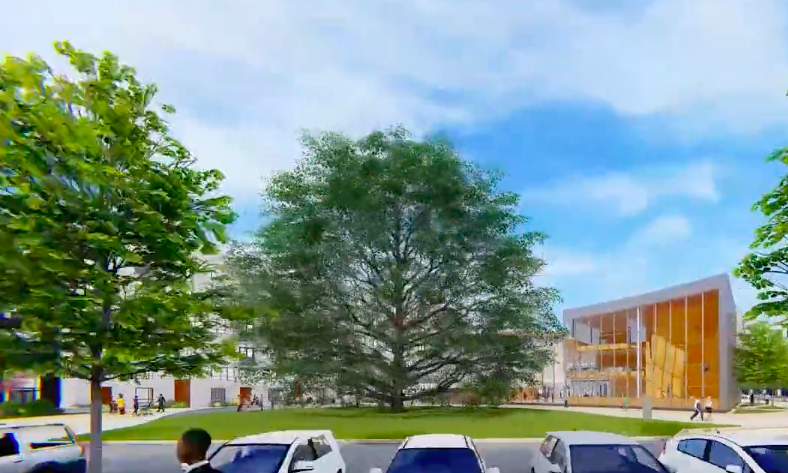
The proposed community center will surround and showcase the 400-500 year-old white oak on the east side of the property. (Screenshot from Ideanomics video)
An access loop will connect the buildings on the east side, and parking will be available on the street as well as hidden behind the buildings.
The Miracle League field and two Little League fields will remain a “signature element” of the campus, and parking as well as drop-off and pick-up will be made more accessible.
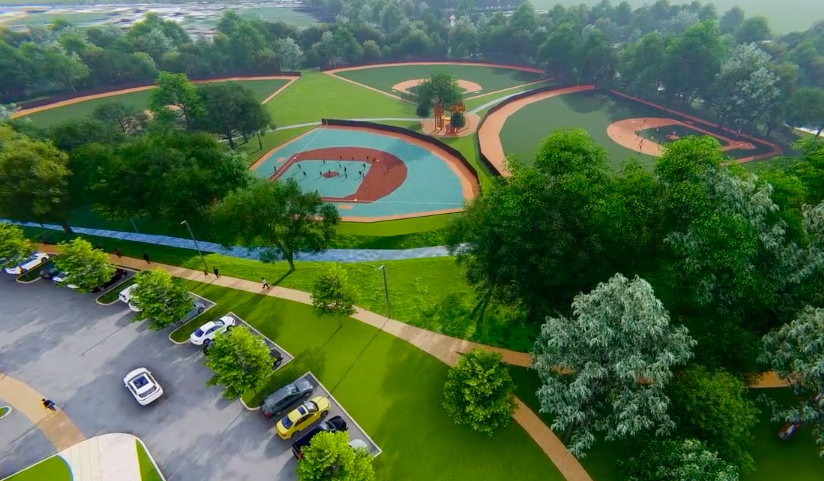
Little league and miracle League fields.
Flooding and groundwater concerns
Part of the former UConn campus’ natural beauty has been the wetlands – ponds and streams that enhance the park-like setting and serve as habitat for wildlife.
During neighborhood outreach, and on the discussion platform “NextDoor,” community members have expressed concerns about stormwater and other wetlands-related issues.
An Ideanomics spokesperson told We-Ha.com that many neighbors noted concerns about this issue during last week’s outreach, and said that the existing site does not appear to have any significant water quality treatment, stormwater detention onsite, or infiltration facilities.
As plans have been and continue to be developed, Ideanomics has been working with civil and stormwater engineers to ensure that the design will result in a significant upgrade to stormwater management.
“The proposed stormwater management system, developed based on a sustainable green infrastructure approach, relies on carefully planted, strategically located and specially designed decentralized stormwater bio-retention basins that fit neatly into the natural landscape. While final calculations are still being run, current numbers indicate that the size of the basins provide adequate volume to detain the flows generated by the site and reduce the peak flows from the site to below existing flow rates,” an Ideanomics spokesperson stated.
Zoning
The property is currently in a single-family residential zone.
Ideanomics will apply to have the town’s existing “Office Laboratory” (BOL) zone changed to a Technology Village District, and then will undergo the process of submitting a Special Development District application.
Since its creation in 1968, no applications have been filed with the town to establish a BOL zone on any property, and Ideanomics intends to create the Technology Village as a more modern version of that zone.
A text amendment to create the Technology Village zone is the first step, then changing the zoning for the former campus to that zone is the second step, then submission of the Special Development District application – all of which require Town Council approval and hearings – is the final step, Hart said.
What business will be conducted on the campus
“Today will become a historical and monumental day … we are going to get on the fast track,” Wu said Monday.
Fintech Village will be about much more than just fintech; it will really be an “innovation park,” he said.
“We now have a gang of four,” said Wu, noting that four types of technologies that will be the focus of businesses on the campus.
Ideanomics is already a worldwide leader in blockchain and artificial intelligence, and will build on that in the financial technology (fintech) industry in West Hartford. He is particularly excited about the prospects of using technology to assist community and regional banks in the area.
Blockchain also has applicability for the tax industry, insurance, and even sports betting, Wu said.
In addition to fintech, the campus will seek to attract “clean tech” companies to expand EV (electric vehicle) technology for public transportation, with an emphasis on technology for creating compact charging stations that will be able to provide a full charge in six to eight minutes. Better rail service is also a focus of clean tech.
There will be an “intelligent medical group” focus on the campus as well, with a goal of bringing state-of-the-art IOT platforms to local hospitals. IOT technology can greatly reduce wasted materials, particularly disposables, and applications also include enhanced robotics to increase productivity, avoid contamination, and even assist with safer storage and transport of organs for transplant.
Companies that develop technology for enhanced firefighting or autonomous driving will be included in the”all others” category.
There are already about 34 companies seeking to relocate to the campus “as soon as our zoning gets approved,” Wu said.
Wu also said that Fintech Village will seek to attract and support nonprofits. Already in the works, he said, is a digital wallet-based program to support Special Olympics, and a global training center for cyber-security that will be created in partnership with the National Sheriff’s Association.
The former UConn IT building – the lone building that is not being demolished – is currently earmarked to become the cyber-security training center, Fischer said.
What’s next
“We’re very, very energized by the strong interest we’ve had in Fintech Village,” Poor said. Ideanomics has received a tremendous number of unsolicited requests from companies that are looking to be involved.
“This will bring a lot of high-paying tech jobs to the area,” Poor said.
Poor said that Wu wants to do things at “light speed,” but “we’re going to work very closely with the town, the state, our partners – remediation and others – to bring this project forward at a very deliberative pace. We want to get this project done as quickly as possible, so we’ll lean into our partners” as much as possible. That will also get the project onto the tax rolls as soon as possible.
He’s hopeful it will lift property values, and also encourage young people to remain in town.
The public engagement process will be expanded, continuing the door-to-door neighborhood outreach with the assistance of Sullivan and LeShane, and also interacting with the community and engaging in “a very active public review process.”
More specific details will be determined as the process unrolls, including the total proposed square footage of the campus buildings which Fischer said can’t be determined until after working with the town.
Initial plans will be submitted this week, Poor said.
The town has already been “the best partner,” Poor said following the press conference. He added that he does not realistically expect ground to be broken until 2020.
Poor said following the press conference that he hopes to get a variance allowing Ideanomics to use the existing IT building on campus as a “welcome center,” staffed with a local liaison, where the public can have questions answered.
The goal, he said, is to make the campus part of the fabric of West Hartford.
“What we’re looking to do here is a reboot and revival of the campus,” Poor said. “At the moment it’s a bit of an eyesore for the town … the water features that are there, the stagnant ponds, it’s not great to look at, there are a lot of geese there.”
Ideanomics really wants to “find a way to create a very successful innovation hub that people will come to.” There is not currently a dedicated fintech innovation hub anywhere in the world, Poor said, and Fintech Village will go even beyond that, and become a “center of excellence.”
Information and descriptive imagery will be available soon at the West Hartford Town Hall as well as the Noah Webster Library and the Bishops Corner Branch Library.
Information will also be posted and updated regularly online at www.fintechvillage.us.
Related stories/more information
UConn turned over the keys to Ideanomics on Oct. 10, 2018.
Like what you see here? Click here to subscribe to We-Ha’s newsletter so you’ll always be in the know about what’s happening in West Hartford!


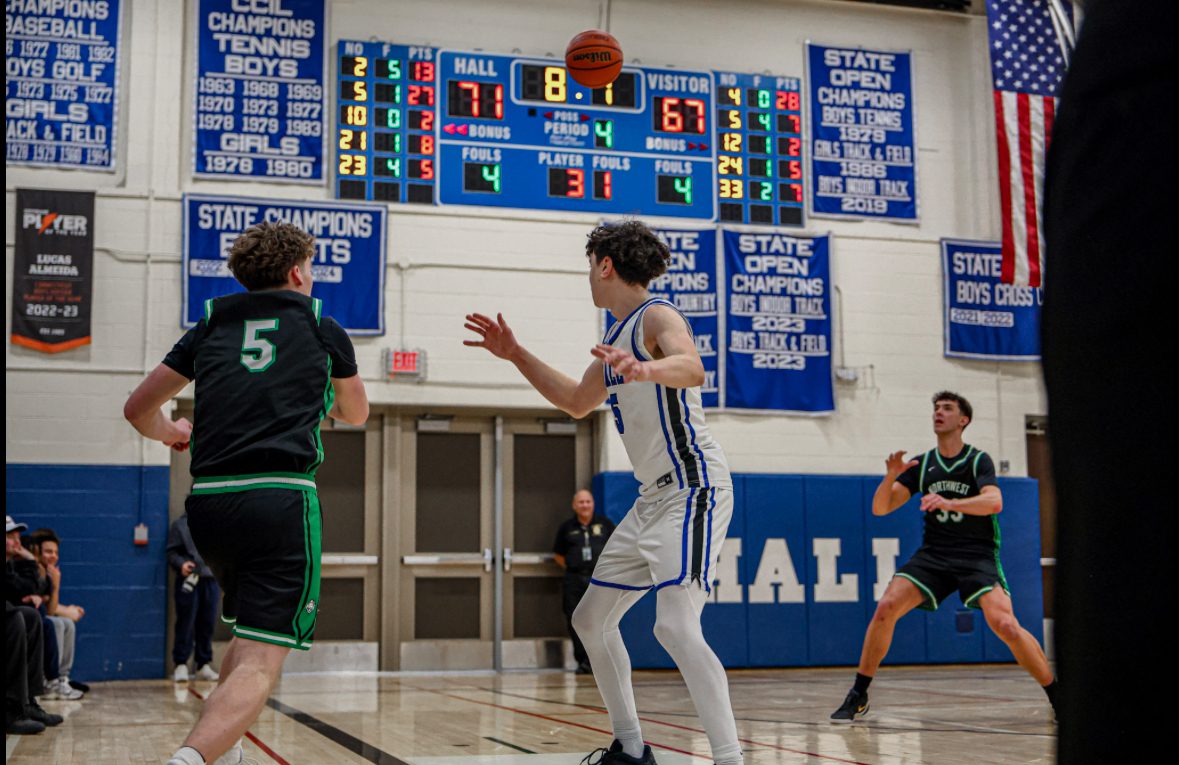

Without delving deeply into the plan, there’s one aspect here that’s wayyy off…only a dozen or so vehicles on the road. It’s already a headache driving N/S in WH, and now there will be more traffic on Trout Brook. Dozens of dozens.
But instead of speeding it up, there will be “traffic calming” measures. So people will avoid it and go to N. Main, where there will also be more “calming”, one-lane each way perhaps. That leaves Prospect…no good, speed bumps…, Steele Road, and Mountain Road. That’s about it, and no good options. Somewhere in this new plan has to be how to deal with traffic. And, $7 million is being spent on Park Rd.-84 ramp to move it a couple hundred feet. Hard to see how this will do much. Shift the funds to upgrading N. Main and Trout Brook and make them safer and quicker. “Calm” roads with islands and cobbles look nice, sure, but the town is full of potholes and terrible pavement. More and more cars in WH every year, we need less calm and more efficiency.
[…] ICYMI, the big news early last week was the unveiling of Ideanomics’ vision for the former UConn campus. While the remediation of PCBs and asbestos, and the demolition of four of the five existing buildings will be taking place soon, there is an extensive process of permitting, zoning changes, hearings, and more before the project becomes reality. If you have a strong opinion one way or another, there will be plenty of opportunity to voice it. Click here to see the renderings, and view the video flyover/walking tour of the proposed project. […]
[…] Last week, Ideanomics unveiled its vision for transforming the former UConn campus into Fintech Village. […]
Ideanomics is supposed to be bringing around 300 jobs in to town but it looks more like space for thousands of people. Ideanomics will be investing in excess of their annual earnings on this development which appears to have an extreme amount of capacity. With the addition of shops and restaurants, it looks more like the applicant wants to BS their way into being a landlord, not a tech company.
What it looks like is a big real estate play, getting subsidies from the state, special zoning from the town and an opportunity to overbuild an office farm to sell later. The town gets even more vacant space, lots of traffic and more expenses to rebuild roads.
Spare us the smoke and mirrors and build to suit the business that has been disclosed. The rest is pie in the sky, as evidenced by Ideanomics’ financial performance. I hope the town can resist the empty promises and keep the development under control.
Info on the company:
https://seekingalpha.com/article/4276339-ideanomics-simply-adding-blockchain-fintech-make-successful
https://www.marketwatch.com/investing/stock/idex
[…] The architectural plans, Poor said, have been modified somewhat from the renderings released during a celebratory press conference in July. […]
[…] Hart said the town is in a different place than it was several years ago when the Council decided not to purchase the property. “We really hoped it would come to fruition, but it hasn’t,” he said of the Fintech Village project, which was celebrated with great fanfare in July 2019. […]
[…] In November 2015, UConn officially decided it would sell the property, and in 2017 opened the Hartford campus. After the town opted not to buy the property, it was purchased by Ideanomics for $5.2 million in 2018 for the purpose of creating the Fintech Village global technology center – plans for which were unveiled with great fanfare in July 2019. […]